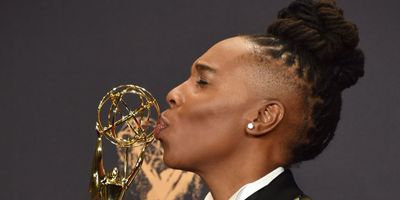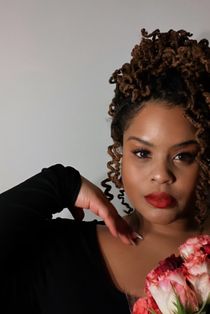Exclusive Interviews

Ad
When Lena Waithe speaks, everyone in the room stops to listen. Words of wisdom pour from her lips like honey, and her lucky spectators lean in to catch every last drop.
On a Tuesday night, just a few days after many of us gave thanks with our families, her effect was no different. A diverse group of people packed into the Melody Ehsani store for the "M.E. Speaker Series" to hear gems from a selection of noteworthy panelists, including the award-winning writer and actress of Master of None, the director of HBO's Insecure Melina Matsoukas, and actor Michael Ealy, who made a surprise guest appearance.
While many of us let out a resounding cheer as Waithe became the first Black women to win an Emmy for Comedy Writing at this year's award show, it's no surprise that she humbly acknowledges that the real prize is being able to transform lives and control the narrative through her writing.
"I think Denzel said it best, 'God gives the reward, man gives the award,'" she said to the room of attendees. "I think they are symbols and also false idols. My Emmy, on purpose, sits on a shelf that's above eye level, so I don't see it every day. It's here; it's a moment, a piece of leverage. The first thing I thought about when Whitney Houston passed, I said, 'I wonder what happened to all of her awards?' I don't want something to be tangible because I can't take it with me, but the way people feel or the conversation that I have or the connections that I made with people—the eye contact, the conversations—that's something that will live in my spirit that I would take with me."
The night carried on with a steady chorus of "mmm's" echoing throughout the space as moderator Erica Williams Simon steered the conversation around topics such as the measure of success and having seats at tables we previously weren't even allowed in the room to witness.
"There was a time when black people were hot," said Waithe. "We had all the movies coming out, then we dried up. Now, the cool thing is stuff with people of color. Now we get Dear White People and Moonlight. Now, we are getting to the office and they are like well, we want stuff with Black people in it, but it has to have a twist. So, now the challenge is on us, don't just come and be like, I'm in the door. That's fine, you can be in the room, you're your drive, talent, clocking the ten thousand hours, that's what's going to keep you there. If you are going to sit at the table, sit at the head of it."
"If you are going to sit at the table, sit at the head of it."
For Waithe, having access to rooms doesn't come without responsibility. While she's climbing up she's also reaching back, serving as a mentor and oftentimes a sister-friend to those who are coming up behind her.
"I believe the best way to start change the world is by starting your own community. What I try to do is real mentorship, not throwing somebody a bone and saying come take this opportunity when you are not ready for it. It's about us that are in the forefront of those that want to be where we are saying what is it that you want, where do you want to be? The mentoring that I do, I tell people that I am going ask you more questions than you ask me."
Mentorship isn't just lip service for Waithe, she actually lives what she speaks. As one of her mentees in attendance attested, they are given opportunities to soak up advice on everything from acting to writing and directing, they get guidance on the right classes to take and the best direction for their careers, and even sometimes are sponsored for classes if their budgets won't allow them to invest in themselves.
And for those that don't have the privilege of learning directly from the master, Waithe encourages people to look amongst their own circles and act as coaches and support systems for one another. It's something that she implements with her own mentees, breaking them into small writing groups to read each other's materials, offer feedback, and serve as shoulders to cry on when times get tough.
"Anyone can learn any lesson, you don't have to be a teacher. You don't have to be Oprah to guide. And I think there is an element of looking here [at people who are at a higher level], which is fair, but also look beside you. That is the community."
"Anyone can learn any lesson, you don't have to be a teacher. You don't have to be Oprah to guide."
Perhaps more importantly than providing people with opportunities, is preparing them for what's to come. Waithe refers to the entertainment industry as a game of human chess, where the moves you make become key calculations for constant ascension, something she too had to learn over the course of her career.
"I don't just want you to be a phenomenal writer, be a politician," she said. "And not just any politician, you have to Barack Obama."
In the game of chess, sometimes being underestimated—being the pawn—has more value than being give a position of royalty.
"For some time you have to be a pawn first; that's apart of it because some people come in here like I want to do it and I'm like okay, you got to crawl before you walk," said Waithe. "Play your position to the best of your ability, and if you play your position well, eventually you will go forward. And then when the time comes or someone puts a crown on your head, don't just shine, but know how to wear it. Don't just ask to be the king, you have to know how to lead."
As a final thought, Waithe warned against tests disguised as opportunities, and where lack of preparation can rob you of your blessing. "There are instances where people will say, 'Here is an opportunity,' be weary of that. Be weary of the desire, this dream, because it will be a bunch of stuff that feels like nothing. If you aren't ready for the opportunity, then it's wasted."
It was clear that this wasn't just a panel discussion, only worthy of a quick "I was there" snap or Instastory post, but a place of communion, where we could gather together, speak our truth, and more importantly, hear solutions from those who are winning on how to continue to make an impact as we go about our respective paths.
And we're thankful for those like Waithe who don't accept praise for their gifts as being synonymous with their purpose, but instead choose to act as servants to others, no matter how high they go.
Featured image by Getty Images
Related Articles Around the Web
- Lena Waithe Wins Emmy: First Black Woman to Get Comedy Writing ... ›
- Lena Waithe on the 'Master of None' 'Thanksgiving' Episode ›
- Lena Waithe is the first black woman to win the Emmy for writing in a ... ›
- Why Lena Waithe's historic Emmy win for 'Master of None' is so ... ›
- Meet Lena Waithe, the Not-So-Thinly-Veiled Inspiration for Master of ... ›
- OUT100: Lena Waithe, Artist of the Year | Out Magazine ›
ALSO ON XONECOLE


